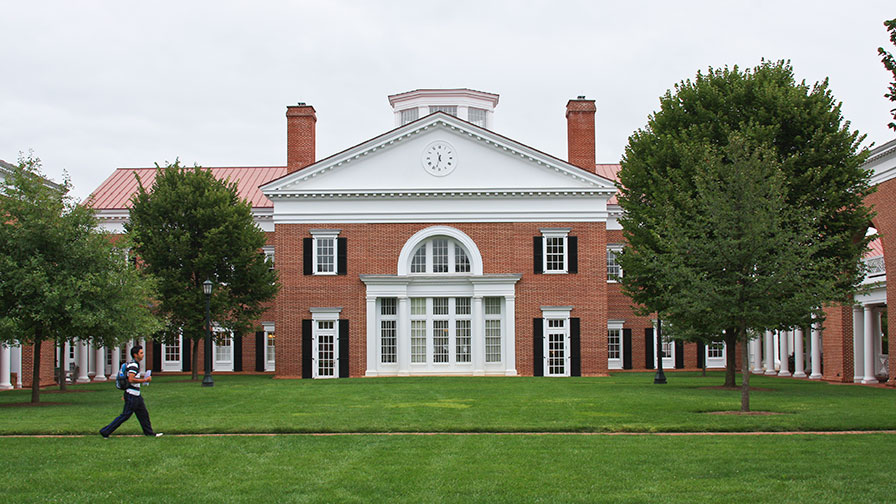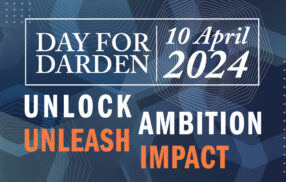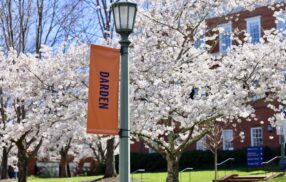
UVA Darden-Sponsored Financial Panel Tackles Biggest US Economic Challenges
By Jay Hodgkins
Ask three people the question, “What is the biggest economic challenge facing the U.S. in the next 10 years?” and it could easily produce three different answers. That is exactly what happened on 17 June at the 2015 Financial Panel in New York presented by the University of Virginia Club of New York and the Darden School of Business New York Alumni Chapter.
Inefficient allocation of capital, companies struggling to find attractive areas to spend capital, mistakes made by the central banking system and government entitlement spending were just a few of the major economic challenges identified by the three UVA alumni on the panel, which was moderated by CNBC “Power Lunch” co-anchor Tyler Mathisen, a 1976 graduate of UVA’s College of Arts and Sciences.
David MacFarlane, managing director at Drake Capital Advisors and a 1984 graduate of the McIntire School of Commerce , lamented that government outlays to entitlements have risen from 30 percent to 65 percent in the last 50 years and will continue to rise sharply given the demographics of the baby boomers. He expressed concern that entitlement spending is crowding out more productive government spending on infrastructure and intellectual property.
Over the last 10 years, funding for the National Institutes of Health has declined by 30 percent, MacFarlane said. And the impact extends to the private sector, where business investment as a percentage of cash flow has declined in the last decade while spending on share repurchases and dividends has doubled.
Trysail Global Founding Partner and Darden graduate Dariush Maanavi (MBA ’95) supported the idea of more infrastructure investment. He noted that low interest rates make now the perfect time for the government to spend “cheap money” by thinking creatively to build roads, bridges and a technology backbone throughout the country.
The entitlement topic drove a lively debate among the panelists over how and whether the federal government can fix entitlement spending and other important political needs like reforming U.S. tax policy. The panelists agreed that the high corporate tax rate incentivizes companies to invest outside the United States and hold money overseas.
“This is a design issue. The question is: What’s the solution?” Maanavi asked. He suggested a pragmatic approach would be cutting corporate tax rates while closing corporate tax loopholes and increasing the minimum wage. “Right now, the last thing any politician is going to do is cut entitlements because there’s been zero wage growth in the last 20 years. However, high corporate tax rates cause corporations to continue looking for efficiencies and cutting wages. If we cut the corporate tax rate, we would invite that money back from overseas and get it back into people’s paychecks.”
Aside from a need for tax reform, the panelists also agreed that the Federal Reserve’s decision to hold the Federal Funds rate at essentially zero and the massive amount of capital sitting on the sidelines as investors seek opportunities has created a challenging environment for quality investment returns.
“One of the big challenges right now is that we are in a very low-return world. I don’t think everyone necessarily realizes that,” said Lawrence Kochard, CEO and Chief Investment Officer of the University of Virginia Investment Management Company(UVIMCO).
Kochard, who holds a bachelor’s degree and Ph.D. from UVA, says individuals, in particular, will face a growing challenge funding their retirement security in this low investment return world.
MacFarlane sympathized with the plight of individual investors, even relatively wealthy ones, noting that investing $1 million in bonds used to generate enough annually to live on — about $50,000 per year — but in today’s environment of 2 percent interest rates on bonds, the math no longer works out.
“The Fed’s policy of cutting the interest rate has really stolen from the saver,” he said. “They’ve been penalized unfairly.”
Maanavi suggested the only solution might be for investors to take advantage of the fact that the low return world is coinciding with a deflationary world where consumers have opportunities to spend less and substitute more luxurious purchases with cheaper goods and services.
The low interest rate set by the Federal Reserve caused the panelists more consternation than just for individuals facing retirement. They said the extended period of low rates has caused an historic excess of capital to pile up on the sidelines, and pent up demand for returns is driving even professional investors to take on more risk. MacFarlane warned these are the exact conditions, historically, “when capital gets destroyed.” Maanavi said it was critical that the Fed begin raising the interest rate simply so it could have a lever to pull when the next economic crisis hits, saying the central bank was currently out of bullets.
Mathisen rounded out the panel by asking each participant to make three predications for the next year: performance of domestic stocks, to what level the Fed will raise the Federal Funds rate, and the U.S. economic growth rate. Their predictions were:
KOCHARD
- 6 percent increase in domestic stocks
- 0.5 percent Federal Funds rate
- 3 percent U.S. economic growth
MACFARLANE
- 6 percent increase in domestic stocks
- 0.5 to 0.75 percent Federal Funds rate
- 2 to 2.5 percent U.S. economic growth
MAANAVI
- 2 percent decrease up to an 8 percent increase in domestic stocks
- 1 percent maximum Federal Funds rate
- 2.5 to 3 percent U.S. economic growth
The University of Virginia Darden School of Business prepares responsible global leaders through unparalleled transformational learning experiences. Darden’s graduate degree programs (MBA, MSBA and Ph.D.) and Executive Education & Lifelong Learning programs offered by the Darden School Foundation set the stage for a lifetime of career advancement and impact. Darden’s top-ranked faculty, renowned for teaching excellence, inspires and shapes modern business leadership worldwide through research, thought leadership and business publishing. Darden has Grounds in Charlottesville, Virginia, and the Washington, D.C., area and a global community that includes 18,000 alumni in 90 countries. Darden was established in 1955 at the University of Virginia, a top public university founded by Thomas Jefferson in 1819 in Charlottesville, Virginia.
Press Contact
Molly Mitchell
Associate Director of Content Marketing and Social Media
Darden School of Business
University of Virginia
MitchellM@darden.virginia.edu





